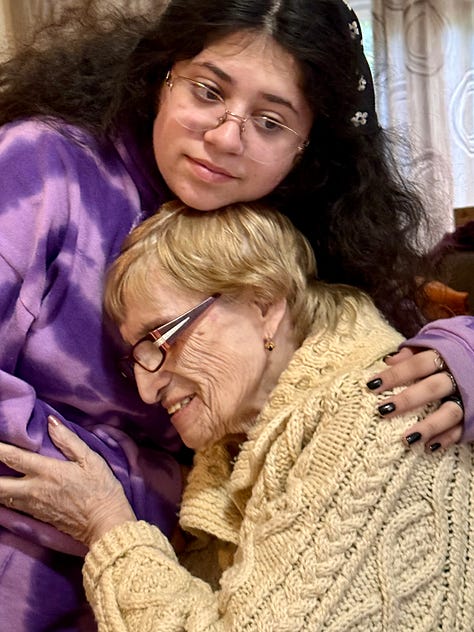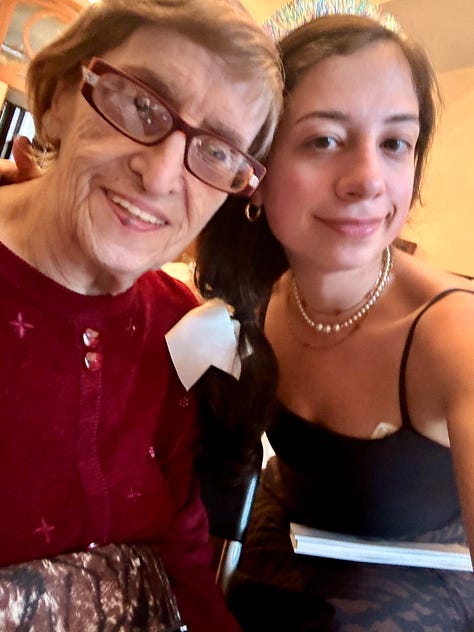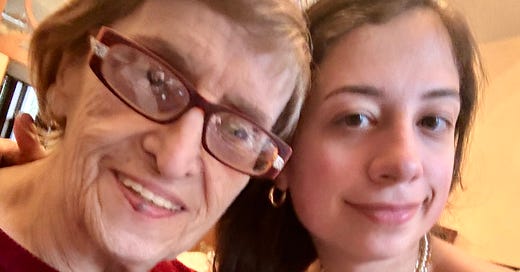Note: For the best experience, read my posts on the free Substack app or in a web browser rather than via email…
Dear spies, I know you're watching, but since following the status quo is all I know how to do, I'll continue oversharing about my private life:
On a solitary, rainy Friday, I binge-watched a promising new Netflix TV show about a spy called A Man on the Inside—it was disappointingly dull.
Though I remained glued to the screen waiting for excitement, it never happened.
Since all I do is feel emotions and write to cope with them, even though this show was boring to me, unsurprisingly, I found myself feeling emotional anyway and writing for all of the 240 minutes I spent on it.
If you keep reading—and I can't promise this won't be as dull as the show—I'll share my review of the show (mostly positive) and five quick notes I spilled down on my phone while watching (mostly unedited).
I'm publishing this for a few reasons:
to practice being raw and spontaneous in my writing
to discuss this show's important themes of loneliness, aging, disability, and spyhood and
because after enduring countless spy jokes about my Russian background, I've earned this moment—so let me have it!
Skip ahead to whichever section interests you more: my review of the show (first half) or my personal reflections on being a spy in America (ending)!
A Man on The Inside
It's never a good idea to be too excited about anything—this is something my mother taught me.
I keep trying to prove her wrong, but after 30 years of living, I can't say I've proved anything.
I was so bored of TV, but when I saw A Man on the Inside, a new comedy starring TED DANSON, STEPHANIE BEATRIZ, MARY ELIZABETH ELLIS, and STEPHEN HENDERSON on Netflix, about SPIES, I knew excitement was back in my life! I hit play immediately—no reviews, no trailers, just pure thrill.
Woof.
I went in expecting the laughter and tears of The Good Place or Brooklyn Nine-Nine. Comparison really is the thief of joy.
With all that context in mind, let me share my review—which isn't so bad:
Katya’s Review of A Man on the Inside:
(no spoils, just feels)
I liked the show. I just wish it were more exciting, funnier, and had better dialogue.
I know. I know. That sounds brutal but it is my truth.
The show makes it out to be about an SPY solving a MYSTERY. Except the spy, TED DANSON, is so dull in this show. He is so much more engaging in every other show I’ve seen him in. It’s not you, Teddy, it is the pace of the show and the script.
Also, there's no real mystery to solve. The plot is obvious to anyone paying attention from the start. I kept waiting for a plot twist, but the show remained predictable throughout.
The setting didn't work for me either. I have no desire to watch more shows set in San Francisco retirement homes. Visually, it felt bland and uninspiring. I don't even want to visit SF again, let alone watch it on TV. And let's be honest—the only eye candy was Ted Danson, who spent the whole time fully clothed and rambling facts about bridges that you probably already know.
Even more surprisingly, I didn't laugh once during the show. If you met me in person, you'd know it's not hard to make me laugh! Instead, it ruined my bright mood and made me feel quite melancholy.
Is the A Man on the Inside joyful (I'll include this question in all my reviews as I catalog what brings me joy)? In a way. Not joyful in the same way as The Good Place or Brooklyn Nine-Nine. But it is delightful to watch older people find joy. You are left with this hopeful feeling that we all can keep finding joy, no matter where we are in life, no matter who/what we've lost.
My feeling at the end was—maybe it's good to have shows in this day and age that are slower-paced and not just aiming for laughs or thrills (assuming that was the intention). This show made me feel many things, even if they weren't particularly positive, and perhaps that alone makes it worthwhile. I shouldn’t need glamour, excitement, and laughter to appreciate something meaningful. In my heart, I believe it's valuable to have more shows about retirement communities and the universal experiences of grief and loneliness that we all face.
So yeah, I wish I had enjoyed watching it more. I wish I had known none of the actors, had no expectations, and watched it in a different mood. But is it the show that is the problem or Katya? I’m not too sure and I am eager to discuss!
Though I'm glad this show exists, it needs to find its footing before I'd binge-watch another season.
My rating? 2 stars for season 1—and 5 stars for my hopes that Season 2 will be better.
Let me know if you've seen the show and what your rating is:
After I watched A Man on the Inside & wrote my review…
I discovered the show received a 94% rating on Rotten Tomatoes and was based on a true story—which did excite me for a moment. A Man on the Inside turns out to be much less depressing than The Mole Agent, the Chilean documentary it's based on. The show wisely avoids focusing on elderly abuse—I strongly believe this was the right choice, since improving retirement homes starts with giving them better media representation.
Besides, watching elderly abuse would have been too heartbreaking for me. I won't be watching the documentary; I'd cry the whole time. I’d rather watch silver-fox Teddy talk about bridges.
Instead of trying the documentary, I binge-watched Shrinking, an Apple TV show about grief and loneliness that's genuinely funny and exciting. I highly recommend it—5 stars from me! (I can write about it another time).
Also, I read other people's reviews of A Man on the Inside, since none of my friends have watched it yet:
Other Writers' Reviews of A Man on the Inside:
these might have spoilers
My favorite quote from Alan:
“Not too old for this shit”.
(Somehow, same)
My favorite quote from Oene:
"In all, in its own charming way, A Man On The Inside is a refreshing throwback to a more innocent time, in which not every spy story has to be about saving the entire world."
(Yay for mid spies who keep a low profile, like me!)
Comedies and Categories
I read many other reviews online but won't include them since they're not on Substack. The consensus was clear—other viewers also didn't find the show funny.
I genuinely wished this show had a laugh track so I could tell where the jokes were supposed to be.
Shows that aren't actually funny shouldn't be labeled as comedies.
We need a new category—something like "thought-provoking entertainment" would be more fitting.
Share your suggestions for a new category in the comments
or participate in the poll below:
And now for my 5 Notes fresh from my phone:
These notes are quite raw and personal! My hope is that even one person will connect with them and feel a little less alone.
1. Notes on Loneliness (cont. from previous posts) …
I am watching this show, unexpectedly confronting its theme of loneliness, and I have feelings:
The man on the inside is lonely. He is old. His wife died. He lives alone.
My lifetime partner, the love of my life, isn't dead (I hope—I mean, I haven't even met them yet!).
I don't live alone in a huge house without a job (not that fortunate),
and I'm not an elderly white man without friends.
So why does everyone expect me to be lonely?
I'm not lonely! Please stop asking if I feel lonely. Why assume I'm lonely just because I don't live with a man? I've tried that—it didn't make me happier, only less cozy.
Besides, my whole life is ahead of me—I haven't met all the people or experienced all the feelings yet!
Note to my future self who might cringe while reading this:
I was binge-watching this show alone and writing alone simply because it was raining, and both Maddi and I were tired after work…
Note to future me & “Society”:
Even if I end up alone and everyone I love dies, I'll join a new community.
I'll take painting classes, poetry classes, pilates—whatever I feel like.
And maybe there, surrounded by people who actually enjoy activities and have time for connection, I'll even find a boyfriend.
But for now, back off.
If you are concerned for lonely people…
great news! you can volunteer at a retirement home!
2. Reasons Why I'd Make a Terrible Spy, According to This Show:
People notice me. I don't know how to be invisible. Trust me—I've been practicing.
I write everything down.
I yap too much.
My name is Katya, and I don't respond well to being called anything else.
I am bad at enthusiastically talking to people I really don't want to talk to.
My life is so absurd that I'd have to lie just to be believable.
Teddy only lied about why he's at the retirement home and who his daughter is. I'd have to change my whole identity.
I don't fit in. I'm not good at fitting in.
I am too online. Too much to cover up.
If I were punched, I'd cry and quit.
I'm not a fighter.
I'm not a lover.
I'm a crier.
3. Dementia & other Disabilities
My grandma has been losing her short-term memory.
She knows who I am (her favorite granddaughter).
She knows who is dead (unfortunately needs anti-depressants because of that).
She knows who she is (even if she is the more aggressive and sad version of herself).
But once, when a swan bit her hand, she forgot about it an hour later, raved about the swan, and then went back bravely to see her new favorite animal.
She also forgets what she ate last or when she last ate.
It’s not too sad. It's still in the early stages. I still have my grandma.
She starting losing her memory after a UTI.
This is not a coincidence. UTIs are so dangerous for the elderly.
The show portrays how elderly people are often abandoned, particularly those struggling with memory loss.
They make others uncomfortable—illness reminds them of death, so they keep their distance.
This pattern extends to most disabilities: we tend to pull away when someone's “abilities” decline.
This includes mental health.
I have experienced this myself but that’s a story for another time.
Here, in this “Great America”, too often, children don't visit their parents, claiming they're "too busy."
I haven't experienced this.
In my culture, we respect and take care of the elderly.
My grandparents either lived with me or near me.
In my household, the men take care of their mothers.
My sweet father Ilya is making the most of his unemployment by spending hours on FaceTime with my grandma every day.
He is so patient—more patient than my mom, my sister, and me.
He does memory exercises with her, makes her count (grandma is better at simple math than I am), and even listens to her read Russian romance novels full of smut aloud.
I am so proud of him. Everyone deserves a son and father like our Ilyusha.
I have been spying on America, listening to all of you Americans tell me stories about your families, and I know it's not really your fault, but I am so disappointed.
I am heartbroken that we even need a show with these lessons in the first place.
I want better for all of us—them, the elderly right now, and us, the future elders.
4. Reasons Why My Life Resembles a Fancy American Retirement Home (Except I’m only 30):
I go to craft club.
I go to reading club.
I go to writing club.
I love my pilates.
I take long walks.
All the men hitting on me are losing their hair.
I have many elderly friends.
I am paying a lot of money for this lifestyle.
5. Reasons Why I'd Make a Great Spy (According to the Show):
People naturally open up to me about every topic imaginable.
I am a good listener.
I am patient.
I am not always nice but I am kind.
I have a good memory.
I write everything down.
I am adaptable.
I am a loner.
I am not naive.
I am detail oriented.
I like solving problems.
I am good with technology and enjoy trying new technology.
I think I’m going to get the Ray-Ban Meta glasses. So watch out.
Relevant essays from me & others:
Not a raw note, but an ending that felt necessary:
A Woman on the Inside Who Actually Cares
I've felt like a spy my whole life—and who knows, maybe I am? After all, aren't all writers spies?
As a refugee eager for friendships, I've been listening, asking questions, and trying to fit in to a culture that still sometimes feels foreign to me. The “A Man on the Inside” setting and culture in SF felt so foreign to me.
I felt like a spy in Russia too—as if my time there was temporary and I was merely there to observe and learn, not to contribute.
Perhaps this is why I feel the need to create things in the universe, to put them out into the world, instead of just being on the Inside, observing from the outside.
When you observe enough, you begin to care deeply. This was Teddy's problem, too.
When you observe enough different situations, people, and outcomes, you realize that change and improvement are possible.
Often I just want to solve problems and make things better, even when I'm told to only listen.
Whether I'm a spy or not doesn't matter—I know I don't want to be one.
What I learned in the pandemic is I do not want to just be inside (or be on the inside).
I strive to write about the inner worlds of my communities while reminding them to embrace what's beyond their walls.
It is often what's on the outside—the joys, the connections—that count.
Thank you for reading my review of A Man on the Inside, and for my little notes on loneliness, disease, and spyhood, and for dealing with my melancholy mood on this rainy day on which I write this.
The only photos appropriate for this post are of my grandmother Mila. These are raw photos that my family might not approve of me sharing. But I think you can feel the care and love radiating from them—and that's exactly what photos are for.
My grandma Mila is incredible—she has lived so many fascinating lives and means the world to me. I promise to write more about her.



I'm sure this was not the most exciting of posts, but I hope it made you feel things. If this is your truth, please let me know!
or DM me if you want privacy (but staying on Substack), or email me back if you prefer email.
I’d love to talk to you about the show and about any feelings that came up during the show or during this piece.
With care,
your favorite spy Katya











Thank you for linking my piece here!! 🫶🏻 Really enjoyed this, and it's made me realise I too have lots of things against me in terms of ever becoming a successful spy 😅